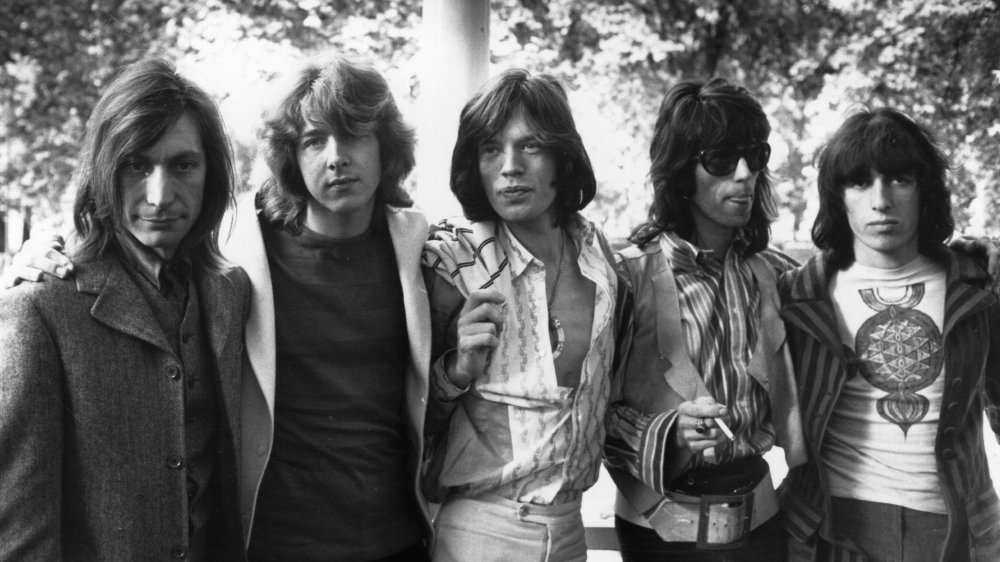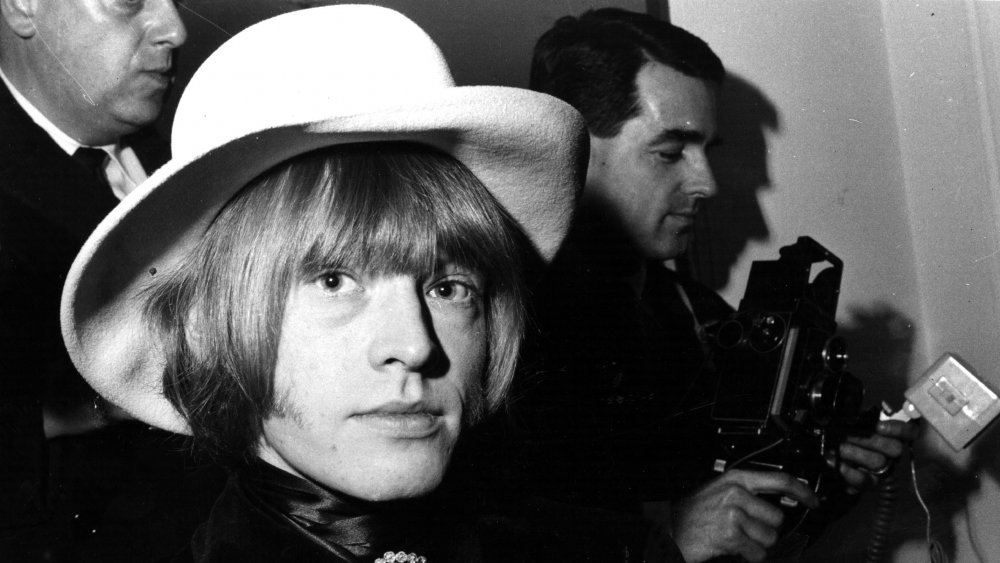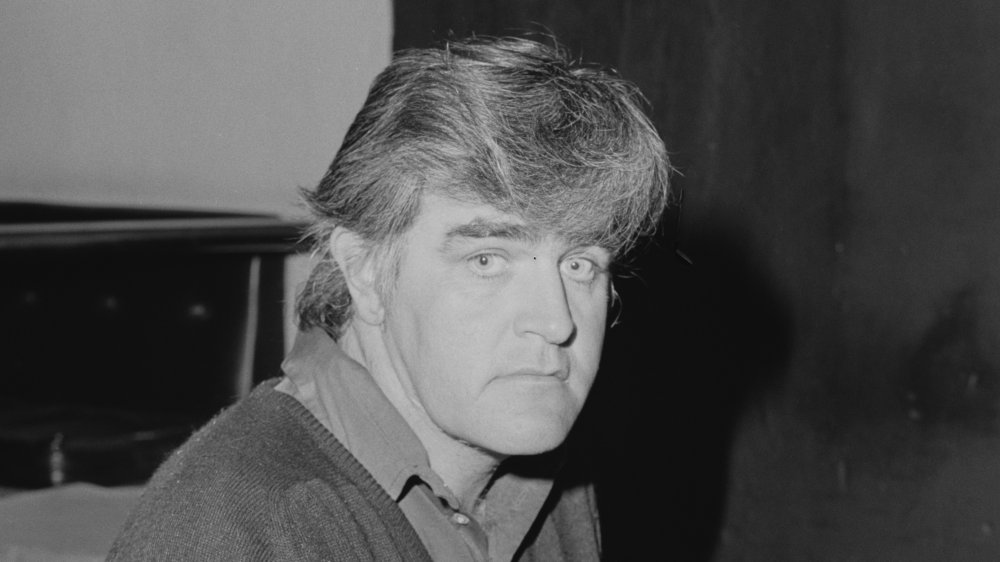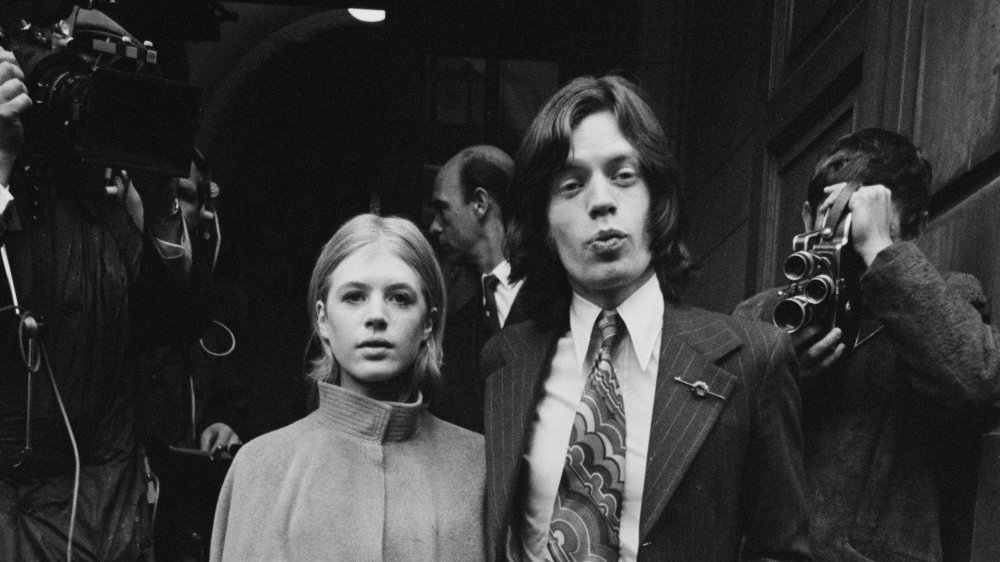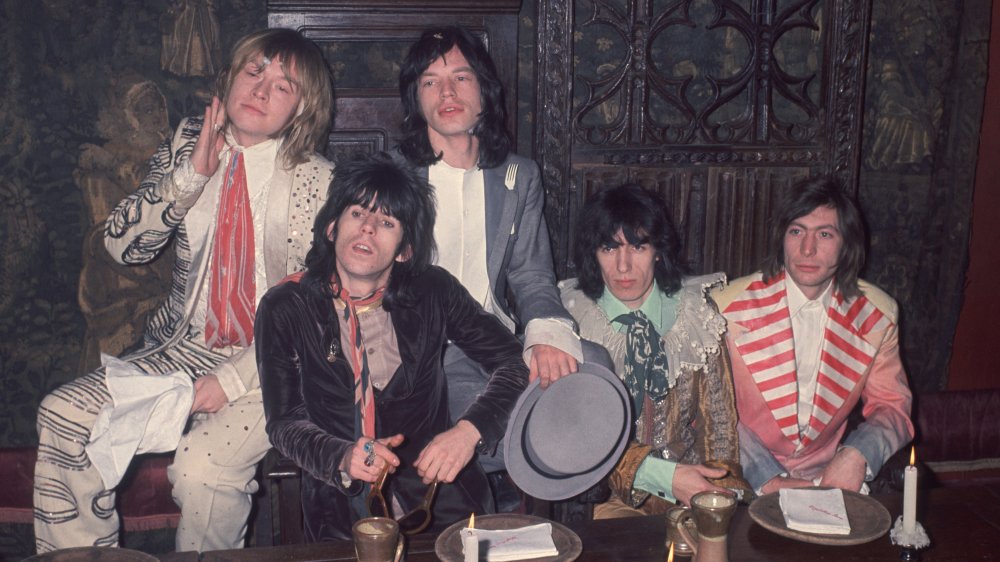The Tragic Real-Life Story Of The Rolling Stones
The Rolling Stones have been sowing the seeds of rock 'n' roll since 1962, and they're still at it despite the fact that every single band member is well into their seventies. It takes a truly unique band to survive for that long, especially when you consider the amount of booze and recreational narcotics the Stones have shoved into their collective system over the years. Their tenacity is even more impressive when you take into account the many, many setbacks, misfortunes and outright tragedies the band has endured over the decades.
How can a band as wild and unpredictable as this conquer problem after problem and remain at the top of the rock 'n' roll heap at an age where most people are looking for their walking canes and yelling at youngsters to stay off their lawn? Let's find out! Here's a long, hard look at the tragic real-life story of the Rolling Stones.
The Rolling Stones and the Altamont free concert tragedy
According to the Telegraph, the Rolling Stones' disastrous free concert at Altamont on December 6, 1969, was "the day the music died." The event was meant to be a happy, hippy, Woodstock-type thing, but as Rolling Stone notes, the location was changed a mere 20 hours before the concert to Altamont Speedway, which was dreary, grey, treeless, and pretty much the opposite of the intended effect, especially as the sound system was laughably underpowered. As a result, some of the audience members grew angry, and the Hells Angels taking care of the security were all too happy to return the hostility. It didn't help that the promoters had neglected to inform the surrounding landowners about the event, and they were quite hostile when they discovered a horde of hippies and musicians hanging about and using their fields as toilets (because the promoters hadn't provided nearly enough of those, either).
The result was an unmitigated disaster. As soon as the Stones' helicopters touched the ground, Mick Jagger was welcomed with a sucker punch. The crowd grew worse and worse by the performer, and by the time the Rolling Stones hit the stage, it was a bloodbath that finally escalated to a point where an 18-year-old audience member called Meredith Hunter was stabbed to death by the bikers during the Stones' concert. The incident thoroughly shocked the band, and a total of four people died at Altamont.
The downfall of Brian Jones
Perhaps the biggest Rolling Stones tragedy involving a band member was the downfall of Brian Jones. As Ultimate Classic Rock tells us, Jones got fired from the band on June 8, 1969, though the other Stones apparently allowed him to announce his own departure as he saw fit. "I no longer see eye-to-eye with the others over the discs we are cutting," his statement started, before going on to lay blame to his former band mates Mick Jagger and Keith Richards: "I want to play my kind of music, which is no longer the Stones music. The music Mick and Keith have been writing has progressed at a tangent, as far as my own taste is concerned." In a way, he had a point — as bassist Bill Wyman would later note, Jones had been the de facto leader of the Stones at the early stages of their career before the sheer personality and songwriting talent of Jagger/Richards bowled him over.
Unfortunately, the world never got to see what Jones had on offer. He was already riding a downward spiral, and UCR writes that within three weeks after his departure, the lifeless Jones was found floating face down in his swimming pool — another member of the infamous "27 Club." Why this happened, is anyone's guess. Though the coroner ruled "death by misadventure," many have suspected over the years that someone else was involved in his death, maybe to the point of murdering him.
The Rolling Stones lost their best musician early on
It's not unfair to say the Rolling Stones are pretty decent musicians. Few people with zero talent can excel for so long and still sell out stadiums well into the sixth decade of their career. However, there's no telling how good they might have been had hey not lost their best musician early on. As Louder tells us, guitarist Mick Taylor was the Rolling Stones' "secret weapon" during the golden early 1970s years in their career, until he unexpectedly walked out in December 1974. The "fluent, melodic player" is still considered as something of "the one that got away" by many fans, and even the band itself, albeit sometimes begrudgingly. Drummer Charlie Watts has called the Taylor period the band's "creative peak." In the 1990s, Mick Jagger came very close to publicly admitting that the Exile on Main Street-era Stones is the best version that ever existed. Even the grumpy guitar maestro Keith Richards has stated that Taylor's departure left the band "in a lurch."
The precise reason for Taylor's departure has always been somewhat shrouded in mystery, largely thanks to the subtly contradicting versions told by Taylor himself. Some say it was about songwriting credits, interpersonal tensions, marriage and/or drug problems, or even simple boredom. It could also be that Taylor simply found the rock star life too much, as he was more of a shy, withdrawn character, which probably didn't mesh too well with the outrageous Glimmer Twins.
The fate of a piano player
When the Rolling Stones emerged, they were a bunch of lean, mean, mop-haired sons of a gun who were ready to take the world by storm. However, as Ultimate Classic Rock tells us, their image might have seemed very different if their manager Andrew Loog Oldham hadn't taken some creative approaches to their lineup. Oldham ruthlessly kicked one of the Stones' founding members, keyboardist Ian Stewart, out of the band simply because he didn't think that the slightly older Stewart would mesh well with the Stones' rebellious image. To be fair, Stewart did look less like a rock god and more like Jay Leno, but still, ouch.
Luckily, this wasn't the end for the piano man. Stewart continued as a behind-the-scenes keyboardist and took up a new career as the band's road manager, which meant that he ... had to look after folks like Mick Jagger and Keith Richards on tour. Double ouch. Nevertheless, he remained a revered figure among the band members. "I'm still working for him," Richards says. "To me, the Rolling Stones is his band. Without his knowledge and organization, without the leap he made from where he was coming from, to take a chance on playing with a bunch of kids, we'd be nowhere."
Stewart was wise enough to avoid the kind of rock 'n' roll debauchery his famous semi-bandmates, but a life with the Rolling Stones is hardly stress-free-He succumbed to a fatal heart attack at only 47.
The great Rolling Stones drug bust of 1967
The Rolling Stones have been known to be quite fond of certain illegal substances, and as NME reports, the "great drug bust of 1967" made it clear to the unwashed masses. This massive police raid at Keith Richards' West Sussex mansion saw both Richards and Mick Jagger (among several others) get arrested, and the ensuing high-profile trial eventually landed the initially nonchalant Glimmer Twins in serious hot water: As the BBC tells us, Jagger ultimately received a three-month sentence for amphetamine possession, and Richards was sentenced to an entire year in prison for "allowing cannabis to be smoked in his home." Fortunately for them, both sentences were ultimately overturned.
Incidentally, it must be noted that the incident was not quite as gruesome as legend would have you believe. As Ultimate Classic Rock notes, there's a persistent legend that the cops bust in just as Jagger was enjoying a Mars bar from girlfriend Marianne Faithfull's, uh, private regions. This, according to Faithfull, is nothing but an urban legend told by thirsty rock historians. Actually, when the law arrived, she had just bathed and the police found her wrapped in a towel.
Bill Wyman has enough
In December 1992, the Rolling Stones went through yet another personnel change. According to Ultimate Classic Rock, this is when long-time bassist Bill Wyman walked out, though Rolling Stone notes the exit wasn't really reported until January 1993. There are rumors Wyman had been unhappy with his Stones gig for awhile before his departure, though band members — Keith Richards in particular — noted they were also nearing a point where they considered letting him go. Richards went as far as to say that he, Mick Jagger, and drummer Charlie Watts were the true core of the Stones, alleging that anyone outside this trifecta was expendable. Good luck, Ronnie Wood.
Wyman himself has said that the Stones didn't want him to leave, and while he's not exactly swimming in money (he left before the big bucks started coming in), Clash reports the ex-Stone went on to enjoy life as a blues musician, photographer, writer, and even archaeologist. He has been known to reunite with the band when need must (their 50th anniversary concert in 2012, in particular) and says he still considers the Stones a family of sorts. He thinks that Watts, in particular, is "fantastic" to work with.
As UCR notes, Wyman was eventually replaced by Darryl Jones, who had played for a roster of talent from Miles Davis to Sting to Madonna. However, he was never made an official member of the group, and remains a "salaried member on tours."
The Rolling Stones and the Brown Sugar controversy
In 1971, as Ultimate Classic Rock and Today tell us, the Rolling Stones released arguably the most controversial recording they've ever made, which is saying something for a band with an entire album called Their Satanic Majesties Request. The song in question was, of course, "Brown Sugar," the Mick Jagger-penned lead single of the Sticky Fingers album. Lyrically, it is a coarse, nasty song about slavery, sexual assault, and such unsavory matters, which the A.V. Club notes did little to stop it becoming a No. 1 hit at the time.
It's unclear if the song's misogynist, racist lyrics were inspired by an actual person. Some say it's about Marsha Hunt, the mother of the singer's first child. Others claim it was about the Stones backing singer Claudia Lennear. Others still think it wasn't about an actual woman at all, and was instead an ode to heroin. Regardless, "Brown Sugar" remains a controversial song, and its infamy wasn't exactly helped by the fact that the band decided to debut it during their catastrophic free concert at Altamont. In fact, even Jagger has said in his later years that he went too far with this particular song. He has been known to change one of the nastier lines, "Hear him whip the women," to a rather more acceptable "You should've heard him" during live performances.
The feuding Glimmer Twins
A successful songwriting partnership is one way to describe the long and rocky relationship between Mick Jagger and Keith Richards. According to the Irish Independent, another, possibly more accurate way is to call them a "civil war" between two massive "ego maniacs." According to Ultimate Classic Rock, the Glimmer Twins' volatile chemistry has been close to breaking up the Rolling Stones several times over their long and storied career. Richards feels that this is largely because while the two stars know each other extremely well, they're also generally a little unsure about each other. Richards pins a large part of the pair's issues to Jagger's "control freak" nature and Richards' own tendency to challenge the singer to the point that he occasionally even wakes up to make notes when he dreams up a particularly good line he can save for later use against Jagger.
Sometimes, the animosity between Jagger and Richards has been more than just professional and creative disagreements. According to the Guardian, one such case came in the 1960s, when Richards became convinced that his girlfriend, Anita Pallenberg, was having an affair with Jagger during a movie shoot. At the time, the bitterness drove the guitarist to write the Rolling Stones classic "Gimme Shelter," and the hurt from that time is still plainly visible in the pages of Richards' 2010 autobiography, Life.
Ronnie Wood loses the plot
Ronnie Wood has mostly been content to play his instrument and live his best life over the years, and as befits a Rolling Stone, said best life has been known to involve the occasional beverage. As the Independent tells us, he's fully capable of challenging the likes of Mick Jagger and Keith Richards when it comes to partying. In 2008, Wood proved this by indulging in a particularly infamous bender, as the 61-year-old guitar man disappeared himself in Ireland, nursing a two-bottles-of-vodka-a-day habit and accompanied by an 18-year-old waitress. Note: Wood's own daughters were all older than that.
While this might seem par for the course for anyone whose business card (probably) reads "It's OK, I'm in the Rolling Stones," it must be said that Wood actively ran off from his wife and family to do this. What's more, this was very much a falling-off-the-wagon situation, and the other Stones reacted with an array of "What are you doing?" phone calls instead of the pats on the back this might have earned him back in the day. According to the Fix, though, Woods did eventually get his act together, and seems to be quite enjoying sobriety.
The Rolling Stones meet the law
The Rolling Stones have had their brushes with the law, according to Ultimate Classic Rock. Their troubles started with Mick Jagger and Keith Richards' infamous drug bust in 1967, and continued mere months later when Brian Jones was arrested for marijuana possession and allowing folks to smoke in his home. All three got away with a warning, though Jones repeated his error in 1968. This time, he was facing prison, but his lawyers were able to plead mental health issues and get Jones away with another warning. However, the situation made it difficult for him to obtain a U.S. visa.
1968 went on to involve yet another marijuana charge (Jagger and Marianne Faithfull, this time), and the 1970s brought even more trouble. In 1972, Drummer Charlie Watts' wife, Shirley, was arrested for causing a scene at an airport. Later that year, Jagger and Richards were yet again arrested, this time for fighting with a photographer. In 1973, it was Richards and drugs again. In 1975, Richards and Ronnie Wood for reckless driving while smelling of pot and carrying a hunting knife. 1977 saw yet another drug arrest for Richards.
After this, the band has apparently cleaned up their act somewhat, though in 1990, Wood was "cautioned" for common assault against his girlfriend. (Not cool, Ronnie.) Still, it appears the apple hasn't fallen far from the tree — in 2011, Richards' daughter Theodora got busted for graffiti and pills.
The Villa Nellcote period
Most people agree that Exile on Main Street is among the finest albums the Rolling Stones have ever released, but its recording process was far from serene. According to the Telegraph, Keith Richards rented a luxurious property called Villa Nellcote on the French Riviera in 1971, after the original location fell through. The building had a fairly strange vibe, as the Nazis had used it as their headquarters during the occupation of France, and the band kept finding painted swastikas in the basement.
The Rolling Stones made the place their home and started wreaking havoc like only early-1970s Rolling Stones could. As the Star tells us, Villa Nellcote became a premier hangout of a revolving door of hangers-on and moochers, not to mention celebrities and the obligatory drug dealers. The place was damp, hot, and creepy (Nazis, remember?) and the eerie atmosphere reflected on the album's sound.
However, the Stones ultimately emerged as winners, seeing as the weird fever dream of Villa Nellcote reflected very well on their creative output, and Exile remains one of their best liked works.
The 1980s crisis that almost broke up the Rolling Stones
As Cheat Sheet tells us, the 1980s were a tumultuous time in the Rolling Stones camp, to a point that it couldn't really be called a single camp at all. Between 1982 and 1989, the band's future was in question thanks to a whole host of reasons. Drummer Charlie Watts, the tireless engine of the band, was wrestling with an addiction to heroin. Singer Mick Jagger, on the other hand, was finding the allures of a solo career more enticing by the year, and by 1987, he was so far down this road that he was touring solo to support his equally solo album. He even went as far as to say that the Stones simply didn't matter anymore: "No-one should care if the Rolling Stones have broken up, should they? I mean, when the Beatles broke up I couldn't give a sh*t." Meanwhile, guitar ace Keith Richards spent his time sulking because the band wasn't working together (and also dabbling with a solo album, because why not?)
While the Stones did have a steady-ish output of new records during the 1980s, things remained volatile until 1989's Steel Wheels and its accompanying tour. Still, as Rolling Stone notes, the Glimmer Twins' relationship at the time could best be described as an "uneasy truce."

